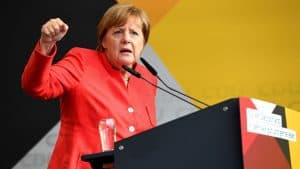
Chancellor Merkel’s insistence on governing in coalition with the leftist Social Democratic Party rather than Germany’s two conservative parties is insuring that Germany’s budget surplus doesn’t go to defense spending
We’ve been hard on the Trump administration’s steel and aluminum tariffs, which were supposed to hit the primary troublemaker, China, but instead are threatening US allies. But one move by the administration is justifiable and consistent with the administration’s otherwise shaky claim that the steel and aluminum tariffs are defense related. In the face of Russian President Putin’s hope of dissolving NATO, the administration is threatening to exempt from the tariffs only the European countries that are meeting the NATO requirement that each member nation dedicate at least 2% of GDP to defense. Europe’s troubles are legion (see below), but the most serious of these is its failure to better provide for the common defense instead of freeloading off the US.
The only four European countries that as of July 2016 met the NATO and Trump 2% standard were the United Kingdom, Greece, Estonia, and Poland.
Europe’s richest, most industrially-capable European country, Germany, only spends 1.26% of GDP on defense. This despite its record budget surplus.
Germany, and indeed Europe’s, troubles have two sources: a politically bankrupt political elite and flawed constitutions.
Sharing the notoriety with Germany as a poster child for both problems is Italy, which only spends 1.1% of its GDP on defense. Unlike Germany, however, Italy has no budget surplus but instead massive deficits.
Both countries’ center-left elites tried until recently to impose on their populaces a massive open borders policy toward refugees from Africa and the Near East, as mandated by the European Union. The result in both cases was the strengthening of extreme parties and especially the conservative and nationalist right. But both countries’ elites have resisted forming center-right governments on the dubious claim that the anti-mass-immigration parties of the right — the AFD in Germany and the Lega in Italy — are neo-Nazi or neo-fascist. The result is continuing policy paralysis in both countries.
Systemic problems from flawed electoral systems
But the paralysis isn’t just due to incompetent elites. By proliferating parties, their electoral systems enhance the likelihood of incapable governments (Germany) or unstable or non-existent government (Italy). Both countries achieve this in somewhat different fashion, but in both cases the instability derives from two flawed election methods: proportional and plurality voting.
Proportional election systems encourage a multiplicity of minority parties. Iraq and Israel are standout examples of such proliferation.
Plurality voting systems are vulnerable to manipulation by third or more parties and candidates; these siphon votes from the party or candidate that otherwise might have won.
Thus, Theodore Roosevelt’s Bull Moose Party cost the Republican nominee William Howard Taft the 1912 election, giving Woodrow Wilson the presidency. Similarly, the prolonged-to-the-end vanity campaign of John Kasich may have cost Ted Cruz the Republican primaries — by splitting the non-Trump Republican vote.
Plurality voting is prevalent in the UK and its former colonies such as Canada, Australia, New Zealand, and the US. “Plurality voting is distinguished from a majoritarian electoral system, in which, to win, a candidate must receive an absolute majority of votes—i.e. more votes than all other candidates combined.”
Majoritarian two-round systems

French President Charles de Gaulle insisted the French Constitution be changed from a parliamentary to a US-like presidential system with a chief executive independent of the legislature
France has a majority electoral system, which it accomplishes by two-round voting. If, in the first round, no candidate achieves more than 50% of the vote, a second round is scheduled for the top two candidates. The winning candidate will then necessarily have a majority of the votes cast. In France’s recent presidential election, right-wing nationalist Marine Le Pen (21.3% of vote) was just a little behind the vote leader Emmanuel Macron (24.01%) in the first round. Since neither candidate had a majority, a second round was held minus all the other minor candidates. Macron dramatically improved his margin of victory, 69.93% to Le Pen’s 39.07%. A majority president has a mandate denied a plurality president, especially when the lead is as dramatic as Macron’s second-round vote.
France also has a strong and independent presidency, much like the US, whereas the rest of Europe, including Germany and Italy, has a parliamentary system, in which the prime minister is not independent but rather dependent on being selected by his party’s legislators and the ongoing support of his governing coalition’s legislators. In Germany, Chancellor Merkel’s governing coalition is comprised of Christian Democrats, Christian Socialists, and Social Democrats.
Why does this matter? Weak governments can’t be resolute in questions of national defense. Chancellor Merkel is dependent on Social Democratic support, but the leftist Social Democrats want the German budget spent on welfare expenditures, not defense. In Italy, whose last experience of military resoluteness, some say, was two thousand years ago, there is presently no government at all.
Putin on the move
Russia meanwhile has gobbled up Crimea and a major chunk of the Ukraine and is looking eagerly at dining on the Baltic states, undermining NATO, and to restore its control of Eastern Europe, if not the half of Germany it ran during Warsaw Pact days.
President Trump can encourage resistance to Putin’s revanchist ambitions by confining his protectionist trade interventions under US trade law’s Section 232 to genuine defense-related issues and doing this in a way not to hurt allies but strengthen them against shared dangers from Russia and China. Better yet, we hope the President will be listening more to his newly appointed pro-trade adviser, Larry Kudlow.
Click here to go to the previous Founders Broadsheet post (“Tariff exclusions create complications for Trump and Republican allies”)

Leave a Reply